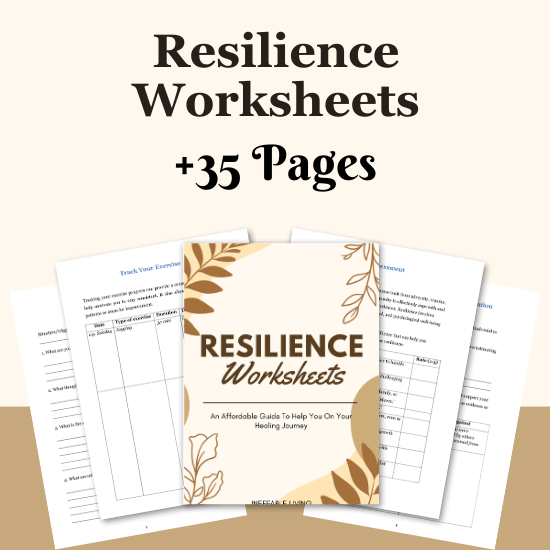Resilience is a crucial skill that can be learned and developed over time.
It allows us to bounce back from setbacks, adapt to challenges, and continue moving forward despite obstacles.
In this blog post, we will explore six traits of resilient people.
Top 6 Traits of Resilient People
Trait 1: Growth Mindset
A growth mindset is the belief that abilities and intelligence can be developed with effort, learning, and persistence.
Resilient people believe that every problem is an opportunity to learn new skills and improve themselves.
Trait 2: Building a Support Network
Resilient people understand the importance of not trying to do everything alone.
They build a team, reach out for support, and are not afraid to ask for help.
This requires vulnerability and the ability to replace shame with connection.
Trait 3: Emotional Regulation
Resilient people develop the skills to tolerate uncomfortable emotions.
They understand that emotions like stress, anxiety, and overwhelm are natural and can be managed through various techniques.
Related: Best 10 Resilience Books
Trait 4: Accept and Adapt
Resilient people focus on what they can control and let go of what they cannot.
They accept the reality of their situation and adapt their actions accordingly.
Trait 5: Flexibility
Resilient people are flexible and adaptive.
They are willing to change their strategies and try new approaches when faced with challenges.
This flexibility allows them to find creative solutions and keep moving forward.
Trait 6: Humor
Resilient people use humor to cope with difficult situations.
Laughing in the face of adversity can provide a much-needed break from stress and help maintain a positive outlook.
Related: How Resilience Works? Top 10 Powerful Ways to Stay Healthy and Happy During Tough Times
How to Become More Resilient?
1. Cultivate a Positive Mindset
A positive mindset is foundational to resilience. It helps you approach challenges with optimism and a solution-oriented attitude.
– Practice Gratitude: Regularly acknowledge and appreciate the positive aspects of your life. Keeping a gratitude journal where you write down things you are thankful for can shift your focus from what is going wrong to what is going right.
– Focus on Strengths: Identify and leverage your strengths. Knowing what you are good at and using those abilities can help you navigate through tough times more effectively.
– Positive Self-Talk: Challenge negative thoughts and replace them with positive affirmations. This can help you maintain a more optimistic outlook even in difficult situations.
Related: Top 13 Toxic Habits Everyone Should Quit To Build Emotional Resilience
2. Develop Strong Relationships
Strong, supportive relationships are crucial for resilience. They provide emotional support, practical help, and a sense of belonging.
– Build a Support Network: Cultivate relationships with friends, family, and colleagues who are supportive and encouraging. Invest time in these relationships by staying in touch, showing appreciation, and being there for them as well.
– Communicate Openly: Share your feelings and experiences with others. Open communication can help you process emotions and gain different perspectives on problems.
– Seek Support: Don’t hesitate to ask for help when you need it. Whether it’s professional help from a therapist or support from a friend, reaching out can make a significant difference.
3. Set Realistic Goals
Setting and achieving goals gives you a sense of purpose and direction, which is essential for resilience.
– Break Down Goals: Divide larger goals into smaller, manageable tasks. This makes them less overwhelming and allows you to make steady progress.
– Celebrate Progress: Acknowledge and celebrate your achievements, no matter how small. This can boost your motivation and confidence.
– Stay Flexible: Be prepared to adjust your goals as needed. Life is unpredictable, and sometimes goals need to be adapted to changing circumstances.
Related: Resiliency Quiz: Am I Resilient?
4. Embrace Change
Change is a constant in life, and being able to adapt to it is a key component of resilience.
– Be Flexible: Learn to adapt to new situations and be willing to change your approach when necessary. Flexibility allows you to navigate unexpected challenges more effectively.
– Learn from Experience: View setbacks as opportunities to learn and grow. Reflect on what went wrong and how you can improve in the future.
– Accept Uncertainty: Recognize that uncertainty is a part of life. Instead of fearing the unknown, focus on what you can control and take proactive steps to manage it.
5. Take Care of Your Physical Health
Physical health and mental resilience are closely connected. Taking care of your body can enhance your ability to cope with stress.
– Exercise Regularly: Engage in physical activity to reduce stress and improve mood. Exercise releases endorphins, which can boost your overall sense of well-being.
– Eat Well: Maintain a balanced diet to support overall health. Proper nutrition can improve your energy levels, mood, and cognitive function.
– Get Enough Sleep: Prioritize sleep to ensure your body and mind are well-rested. Lack of sleep can impair your ability to think clearly and manage emotions.
Related: Top 45 Self Care Day Ideas at Home To Kickstart Your Self Care Ritual
6. Practice Mindfulness
Mindfulness involves being fully present in the moment and can help you manage stress and build resilience.
– Meditation: Practice mindfulness meditation to develop a greater awareness of your thoughts and feelings. This can help you stay calm and focused during stressful situations.
– Deep Breathing: Use deep breathing exercises to reduce stress and anxiety. This can help you maintain a sense of calm and control.
– Mindful Activities: Engage in activities that promote mindfulness, such as yoga, tai chi, or simply taking a walk in nature. These activities can help you stay grounded and centered.
7. Develop Problem-Solving Skills
Effective problem-solving skills are essential for resilience. They enable you to tackle challenges head-on and find solutions.
– Identify the Problem: Clearly define the problem you are facing. Understanding the root cause can help you find more effective solutions.
– Brainstorm Solutions: Generate a list of potential solutions without judging them initially. This can help you think creatively and explore different options.
– Evaluate and Choose: Assess the pros and cons of each potential solution and choose the best one. Be prepared to adjust your approach if needed.
– Take Action: Implement the chosen solution and monitor the results. Taking action can empower you and boost your confidence.
Related: Top 19 Emotional Intelligence Activities (To Improve Low Emotional Intelligence)
8. Enhance Emotional Intelligence
Emotional intelligence (EI) involves recognizing, understanding, and managing your emotions and the emotions of others.
– Self-Awareness: Increase your awareness of your emotions and how they affect your thoughts and behavior. This can help you manage your reactions more effectively.
– Self-Regulation: Practice controlling your impulses and managing your emotions in healthy ways. This can help you stay calm and composed during stressful situations.
– Empathy: Develop the ability to understand and share the feelings of others. This can improve your relationships and provide you with additional support.
9. Maintain a Sense of Purpose
Having a sense of purpose gives you direction and motivation, which are crucial for resilience.
– Identify Your Values: Determine what is most important to you and align your actions with your values. This can give you a sense of fulfillment and motivation.
– Set Meaningful Goals: Pursue goals that are aligned with your values and passions. This can provide you with a sense of purpose and direction.
– Contribute to Others: Engage in activities that help others, such as volunteering or mentoring. Helping others can boost your own sense of well-being and purpose.
Related: Emotional Maturity vs Emotional Intelligence

Conclusion
Resilience is not just about trying harder or being tougher. It’s about developing a toolbox of skills that help you bounce back from setbacks and adapt to challenges.
By adopting a growth mindset, building a support network, regulating your emotions, focusing on what you can control, being flexible, and using humor, you can become more resilient.



